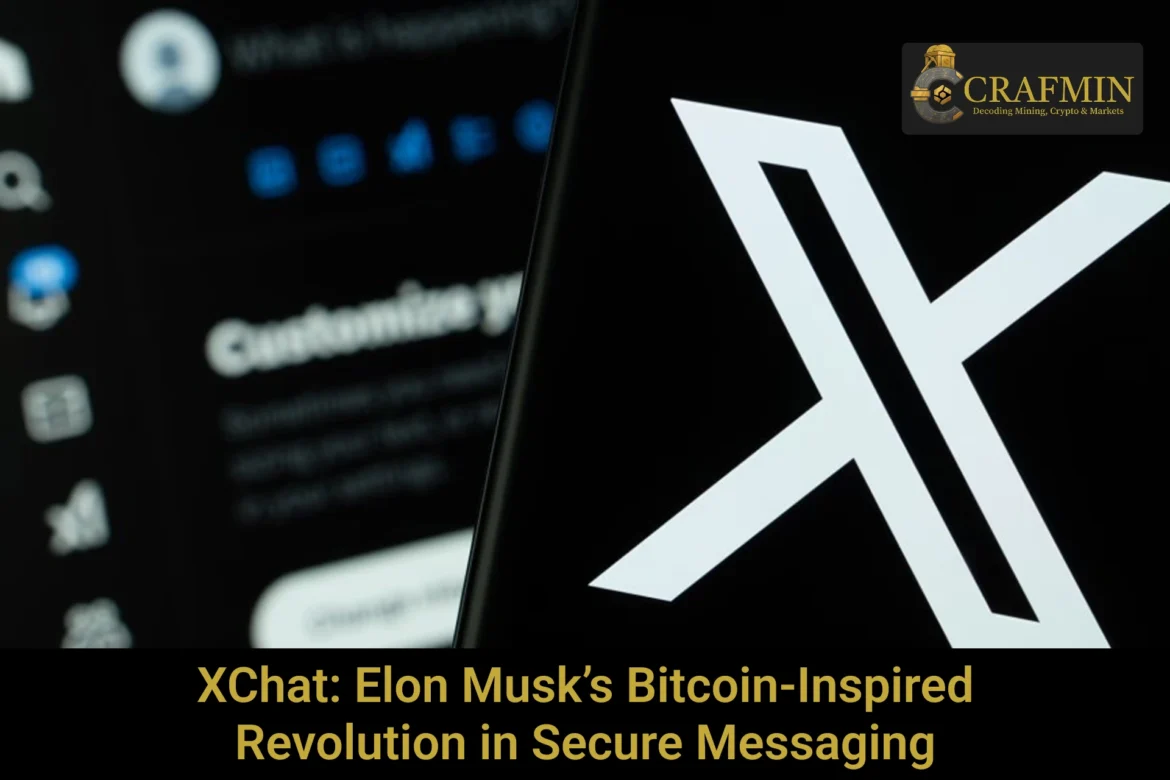In a digital age plagued by privacy breaches, data leaks, and mounting surveillance, a new disruptor has entered the battlefield—and it carries the signature of none other than Elon Musk. With his latest innovation, XChat, Musk aims to redefine secure communication by integrating Bitcoin-grade encryption into a decentralized messaging app, offering users an unprecedented level of privacy.

This isn’t just another Silicon Valley launch. XChat signals a seismic shift in how we might think about digital identity, communication, and autonomy in the 21st century.
Why the World Needs XChat Now

Representative image of the X app
Over the past decade, major messaging platforms like WhatsApp, Facebook Messenger, and Telegram have dominated global communication. But these platforms come with compromises—centralized databases, metadata tracking, data harvesting for ads, and reliance on phone numbers tied to real-world identities. Even privacy-focused apps like Signal, while offering strong encryption, still tie your account to your SIM card.
This is where XChat enters the frame—not as an alternative, but as a revolutionary platform designed around user control, not corporate convenience.
Developed under the umbrella of Musk’s X (formerly Twitter), XChat is built on the idea of digital sovereignty, providing tools for users to engage without being tracked, monitored, or profiled. It’s a timely response to public demand for more transparent, decentralized, and secure systems.
Built Like Bitcoin: How XChat Handles Encryption
XChat’s core encryption draws heavy inspiration from Bitcoin’s architecture, particularly the use of SHA-256 hashing and public-private key cryptography. Here’s how it works:
- Each user receives a public and private key pair upon signing up.
- Messages are encrypted with the recipient’s public key.
- Only the corresponding private key can decrypt the message.
What sets XChat apart is that these keys are never stored on centralized servers. This means even the platform cannot decrypt or access user data—a level of security rarely achieved in mainstream apps.
In essence, XChat treats your conversations like Bitcoin treats your money: as your property, under your control, with no third-party access.
Rust: The Engine Under the Hood
The choice of Rust as the core programming language for XChat adds a second layer of strength. Rust is renowned for memory safety, concurrency, and eliminating common vulnerabilities found in C or Java-based systems.
These qualities ensure that XChat is not only secure on the front-end (via encryption) but also stable and secure at the infrastructure level. It’s like building a castle on rock instead of sand.
Also Read: XRP’s 2025 Surge: Outpacing Bitcoin with Strategic Alliances
Unique Features That Set XChat Apart
- No Phone Number Needed
Users can register without linking their phone number or email. This reduces the risk of identity correlation and SIM-based surveillance. - Default End-to-End Encryption
Every interaction—text, audio, video—is protected automatically. There’s no toggle to forget or misconfigure. - Disappearing Messages
Ephemeral conversations can be enabled for sensitive discussions, leaving no long-term trace. - Cross-Platform Integration
Whether you’re on Android, iOS, Windows, or macOS, XChat offers a synchronized and seamless experience. - Zero Ads. Zero Data Mining.
Unlike WhatsApp or Facebook Messenger, XChat’s monetization does not depend on user data. A premium subscription model ensures financial viability while respecting privacy. - Digital Wallet Compatibility (Coming Soon)
With Musk’s clear interest in cryptocurrency, the integration of Bitcoin micro-transactions and tipping could create a secure, crypto-native payment ecosystem within the chat app.
Redefining Digital Identity
Most modern messaging platforms are rooted in Web2 infrastructure—centralized, permissioned, and tied to real-world credentials. XChat takes a Web3-native approach, where:
- Users control their identity through cryptographic keys.
- There’s no dependence on government-issued IDs.
- Pseudonymity and privacy are the defaults—not the exceptions.
This kind of decentralization empowers individuals, protects vulnerable groups (journalists, activists, whistleblowers), and reduces exposure to corporate or governmental overreach.
“Cryptosecurity”: A New Category
Musk is doing more than creating an app—he’s attempting to define a new security paradigm. Much like Bitcoin introduced the concept of decentralized finance, XChat introduces decentralized communication.
This idea, dubbed “cryptosecurity,” goes beyond privacy. It represents:
- Immutable trust protocols
- Transparent, auditable systems
- Elimination of gatekeepers in digital infrastructure
And while competitors like Signal or Telegram have dabbled in privacy, none have implemented such a holistic, crypto-aligned philosophy.
Competitive Landscape: Can XChat Win?
Certainly, it’s a crowded field. WhatsApp has billions of users, and Signal has the backing of privacy advocates worldwide. But both rely on phone number verification and are still, to some degree, centralized.
XChat’s advantages are clear:
- No personal identifiers needed
- Peer-to-peer encryption rooted in Bitcoin security
- Backed by Elon Musk, a global tech icon
- Positioned inside the X ecosystem, giving it an immediate user base
If any app has a shot at challenging the status quo, it’s this one.
Bitcoin and Market Influence
Interestingly, the announcement of XChat had an immediate ripple effect on the crypto world. Bitcoin prices surged nearly 2% within hours, suggesting investor confidence in the broader application of Bitcoin’s architecture beyond finance.
This is no coincidence. By aligning a major communication platform with Bitcoin-level security, Musk is helping to rebrand BTC as more than a currency—it’s becoming a technological blueprint.
The Road Ahead for XChat
As of now, XChat is available only to premium X subscribers. Musk’s strategy seems to be:
- Test at scale with a trusted user base
- Collect security feedback
- Rapidly iterate and optimize
- Then roll out globally
In the long term, XChat could become:
- A decentralized super-app
- A crypto-native communication and payment system
- A secure identity layer for the internet
The timing is perfect. As AI, surveillance capitalism, and privacy concerns escalate, users are yearning for trustworthy, transparent platforms.

